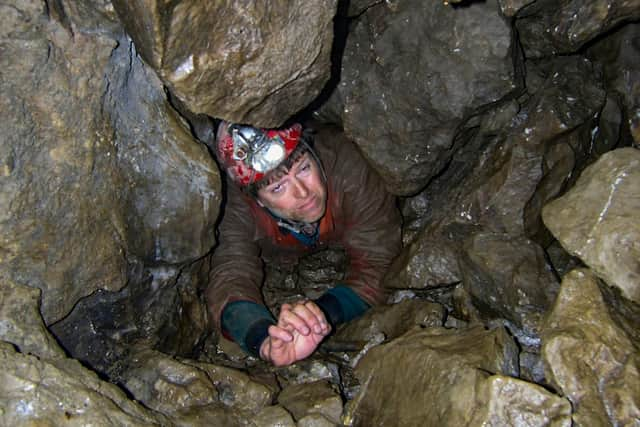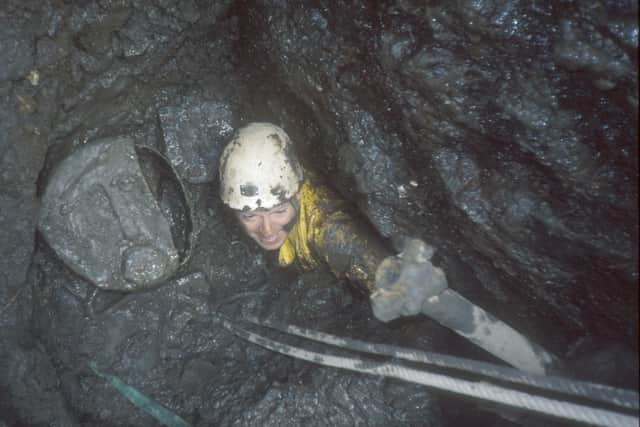The theory of the Yorkshire Dales' deepest cave, yet to be discovered under Ingleborough
Recently, a geological study has been conducted to support a theory that the deepest cave in the Yorkshire Dales is still yet to be discovered.
New data published by Aaron Campion, a graduate from the University of Hull and brother of this writer, has speculated that it is concealed under the southern slopes of Ingleborough.
Advertisement
Hide AdAdvertisement
Hide AdThere are more than 2,500 known caves in Yorkshire according to the Yorkshire Dales National Park.


Aaron, 25, outlines how many people have speculated that there is an underground system around the Newby Moss area, a system with the potential to be the deepest traversable network in the Dales.
But there has been little sign of a breakthrough in discovering such system’s ‘master cave’, among cavers and scientists.
“It’s a really exciting time to be interested in cave exploration and be on the edge of a discovery of this magnitude,” says Aaron, who has lived in the Yorkshire Dales for more than 20 years.
Advertisement
Hide AdAdvertisement
Hide Ad“I know that there is a lot of notable cavers and scientists who have long speculated a master cave’s existence so to find an answer would prove a long-held theory.”


The idea of the existence of the cave came to light in the 1950s, sparking a race amongst cavers to find a way into the cavern.
Since then curiosity and the number of cavers worldwide has grown. But seventy years later, the search continues.
“If a cave is found, it will be the deepest traversable system in the Yorkshire Dales, so everything we’re doing now is history in the making,” says Aaron, who has plans for further research.
Advertisement
Hide AdAdvertisement
Hide AdThe British Caving Association currently has over 6,000 active members. And with a large number of caves in the UK being in the Yorkshire Dales, there is hope that a master cave will be found through a collaborative effort.
Honorary president of the International Union of Speleology Andy Eavis says: “I categorically, definitely believe there is a master cave under Ingleborough.”
Andy, who studied mining engineering at the University of Leeds, says he and his peers “were all looking for the master cave under Ingleborough”.
But “caves don’t give up their secrets very easily,” he says. “There is always more to be found.”
Advertisement
Hide AdAdvertisement
Hide AdAndy has explored caves for more than 50 years and given a Ted Talk on his passion for the underground world.
He has aided in the discovery of hundreds of miles of underground systems in Britain and is hopeful this cavern will be discovered.
“A master cave under Ingleborough would be a wonderful thing,” he says.
“It’s very likely there and it could easily be cave-able and with luck it won’t be completely flooded.”
Advertisement
Hide AdAdvertisement
Hide AdThere is, however, the potential for it to be “all under water”. “It won’t necessarily be air filled passages,” explains Andy.
The master cave “could potentially be quite big, the area has been extremely affected by glaciation".
"Aaron’s research has given us some good results and tell us more about what’s under the mountain,” he
adds.
Dr Trevor Faulkner, a karst geomorphologist is more sceptical about the theory of a master cave.
Advertisement
Hide AdAdvertisement
Hide AdThough he says its existence is “irrefutable”, it could be a conduit, meaning although it “transmits water” it may be “too small for human exploration”.
Dr Faulkner, an Honorary Research Fellow at the University of Birmingham, explains that the possible origin of the cave is due to “the south end of Ingleborough [being] different from the western flank, it is more tectonically controlled by earth movements, creating fractures”.
It means, he says, that the likelihood of the existence of a master cave may be more complex to prove but not impossible that it exists.
Back to Aaron’s research; it has aided cavers and sparked interest amongst the speleological community, giving pointers on how best further exploration can be conducted.
Advertisement
Hide AdAdvertisement
Hide AdActive caver of 54 years, Russell Myers is chair of the British Caving Association. "Caves are where you find them,” he says. And finding one involves “a huge amount of luck”. "You’re also not going to walk into it without a lot of hard work.”
Key also is finding the right place to start digging, “because it’s not an open system”, he says.
Russell is hopeful that a cave exists but believes that further research is necessary to support the theory and to gain more insight into its whereabouts.
“We’ve got to find it to prove it, but it is something worth pursuing,” he adds.
Advertisement
Hide AdAdvertisement
Hide AdRussell highlights how politics can be at play in caving, recounting an experience in the 1970s.
He says he and a team of cavers went to Pillar Holes on Newby Moss and were confronted by another club who got “quite shirty with us because they felt it was their territory”.
But Russell, who has been a caver since the age of 16, is positive that “the politics are a lot better than they were”.
"There’s a lot more collaboration that goes on [between cavers] if people have an interest in a certain area”, he says.
And with that, he is hopeful that cavers will come together to find what could be the deepest cave in the Yorkshire Dales.